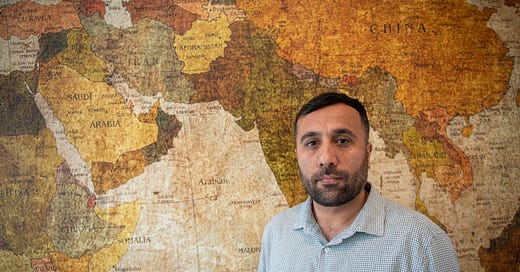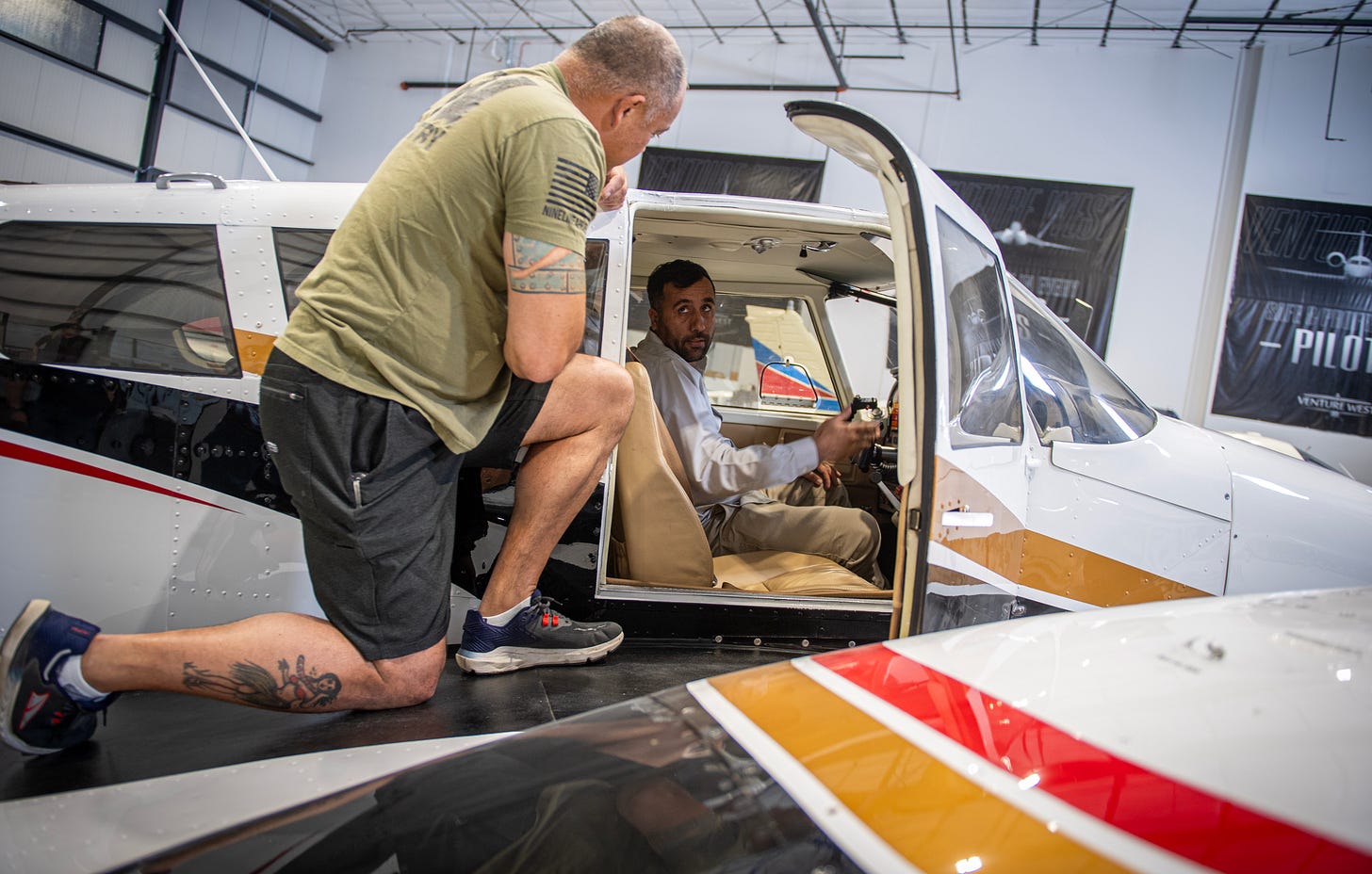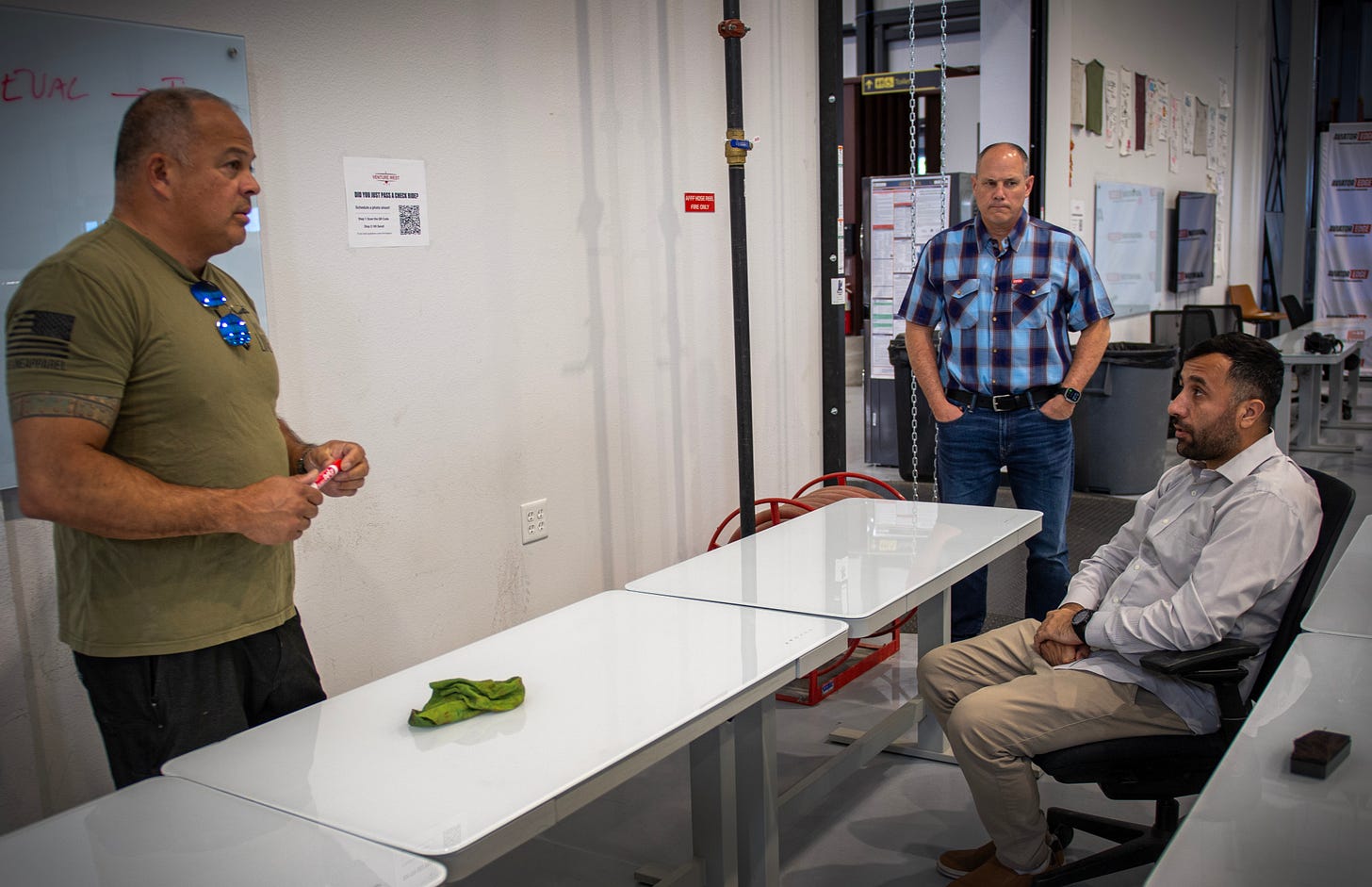From Black Hawks to Uber: Afghanistan's Top Guns Struggle for New Flight Paths
The Kindness of Strangers; the Nightmare of Red Tape; the Dream of Getting Back in the Air
PHOENIX, Arizona -- For almost two decades, they were brothers-in-arms. Afghanistan’s top guns, trained to fly helicopter gunships against the Taliban, were the key battlefield asset in America’s longest war, which ended in ignominy almost four years ago. Evacuated to the United States when their country collapsed, these elite airmen sometimes feel like they are now the enemy.
It’s “been a migraine,” said Col. Salim Faqiri, 34, who flew 5,000 combat missions during a 15-year career in the Afghan National Army and Air Force.
“We all worry. They are killing the people who helped the Americans every single day,” he said. “Every day I wake up, I ask, ‘Will my family be safe today? Will the Taliban find us?’”
After the Taliban re-took control of Afghanistan in August 2021, hundreds of pilots like Faqiri -- America’s frontline allies -- were among the many thousands of Afghans who fled to the United States. About 50 pilots landed in Arizona. Many now work as Uber drivers or dishwashers or rely on charity.
The United States spent $8.5 billion developing the Afghan air forces, according to the Special Inspector General for Afghanistan Reconstruction (SIGAR). By September 2020, 196 pilots had received training at a cost of around $1 million each, it said in a January 2022 report. They flew MH-6 Little Bird gunship helicopters in combat, often supporting U.S. forces, and medivac missions. They also flew Black Hawk or Mil Mi-17 troop transport choppers. According to some reports, they have up to 1,200 flying hours each, matching or even surpassing their U.S. comrades.
It all seems so long ago, said Faqiri, “Here, we are waiting, lost. Our skills don’t matter. I drove Uber for months because I had no other way.”
As the U.S. military and civilian services like air ambulances face shortages of helicopter and fixed-wing pilots, these men are tethered by a tangle of red tape. Their wives, unfamiliar with work or English, struggle to adapt. Their children, meanwhile, are becoming little Americans, as their fathers’ dreams remain on the tarmac.
Coping with the collapse of their country’s U.S.-supported government, and the return to power of the Islamist regime has been traumatic. The shock of losing everything has been compounded by the cruel uncertainty of immigration policy.
Many of the “freedom pilots,” as they are known in Arizona, fear deportation. The Department of Homeland Security has revoked “temporary protected status,” or TPS, for Afghans, a move that could send them back to a country now ruled by their enemy. It has already been a death sentence for soldiers, police, and airmen returned from Iran and Pakistan. Others live in hiding to avoid Taliban death squads.
Still, Homeland Security Secretary Kristi Noem defended the decision. In a statement on May 12, she said conditions in Afghanistan had “improved,” and the economy was “stabilizing,” leaving “no reason to prevent Afghans from returning home.”
When pressed for clarification, DHS Assistant Secretary Tricia McLaughlin said by email that those fearing persecution could “request asylum.” Others, she added, were welcome to leave the United States voluntarily, with a “free one-way plane ticket and $1,000 in financial assistance to help them resettle elsewhere”. The same offer was extended to Afghan Christians, despite warnings that returning “equates to an almost-certain death sentence,” according to Christianity Today.
The uncertainty has deepened the struggle to rebuild. Local allies, like Navy veteran Jack McCain, son of the late Senator John McCain, and Margo Treese, a Phoenix powerhouse, have tried to help. But they’re yet to get the Arizona Afghans back in the air. McCain trained many of them in Helmand and Kandahar, and founded Operation Eagle Foundation to evacuate them as the collapse loomed.
Treese is a director of Flight Path Vectors (FPV), an aviation academy near Phoenix that has supported the pilots since arrival, arranging housing, schooling, and medical care. FPV also helped verify flight logs, a crucial step for Federal Aviation Administration registration, but complicated by the fact that many pilots destroyed their documents to protect families if the Taliban tracked them down.
Al Timpauer, an FPV executive and Iraq War veteran, said the pilots’ immigration status had sown confusion and slowed resettlement, as it has for Afghan airmen elsewhere in the country. “If the government had stepped aside, we would have fixed this in 90 days,” Timpauer said. The Arizona cohort are at varying stages of securing legal permanent residence.
The personal toll on the pilots has been heavy. On my recent visit to Phoenix, Faqiri was the only one willing to speak on the record. Others feared drawing U.S. government attention -- or Taliban revenge against their families.
“They killed my friends. The Taliban watch us even here,” Faqiri said. In a long conversation, Faqiri re-lived the final days of the republic and his decision to leave his country for his own safety and for the future of his two young daughters.
“It’s a hell for them,” he said of women and girls living under Taliban rule. Girls cannot go to school after elementary level; women cannot work or leave their homes without a chaperone or even talk to each other in public. People generally live in fear in a misogynist theocratic state ruled by the Supreme Leader’s decree.
The Taliban’s return to power was guaranteed by the Doha Agreement, signed by President Donald Trump in February 2020. Bypassing the Afghan government and its people, the deal pledged a full U.S. withdrawal within 14 months. By the time President Joe Biden took office in January 2021, only 2,500 troops remained.
As the Taliban stepped up attacks, it became clear that Afghanistan’s only real military edge lay in its air power — Black Hawks and Super Tucano jets. But these aircraft depended on U.S. contractors for maintenance. Biden didn’t renew the contracts. Grounded planes meant no airstrikes, no medevac, no advantage.
Corruption riddled the armed forces and government. Soldiers lacked basics: food, ammunition, even water. The Taliban, meanwhile, were flush with cash from Pakistan, Gulf donors, and warlords hedging bets. Politicians switched sides. The collapse became a rout.
Western leaders helped seal the defeat. Desperate to end an unpopular war, they spun a story that the Taliban had changed. Britain’s top general, Sir Nick Carter, praised them as “country boys” with a “code of honour” and a taste for inclusive government. It sounded like a farewell fantasy. In reality, the old Taliban never left; they just waited for the West to walk away.
The former president, Ashraf Ghani, fled to Uzbekistan on August 15, 2021, taking with him any hope of a negotiated settlement. His vice president, Amrullah Saleh, had already gone to the Panjshir Valley, where he joined Ahmad Massoud, son of late resistance leader Ahmad Shah Massoud, who had kept the province free of Taliban rule from 1996 to 2001. But neither Saleh nor Massoud had the leadership skills or firepower to mount a serious defence. They soon escaped to Tajikistan.
Faqiri watched it all unfold. Flying between Kandahar, Helmand, Kabul, and his native Panjshir, he took stock of collapsing fronts and desperate calls. Some urged him to join Ghani’s helicopter retreat to Uzbekistan. Others pulled him toward the resistance in Panjshir. Either way, the choices were grim.
“We didn’t know who would survive. I wanted to fight, but I had to protect my family,” Faqiri said. “I left because I had no choice. I had to save my daughters from a nightmare.
“People think you leave your country because you want a better life. No. You leave because you have no choice, because your life is in danger every day.”
Treece, of FPV, said the academy wants to help the pilots secure credentials for aviation industry jobs. FPV has established “a way to vet the best candidates for flight school by setting criteria that will need to be met, such as taking a financial literacy class and signing a code of ethics,” she said.
It's not cheap, so “we are looking for donors to establish a funding mechanism for them to apply for low-interest rate loans, giving them better tools for buy-in and everyday financial skills,” she said.
“We are trying to look at the whole picture for them, which may mean other well-paying aviation jobs, as well as pilots, if that no longer suits their skills or needs,” she said.
Faqiri is the first of the Arizona freedom pilots to attend FPV’s flight school; he started daily classes in May. “He will be our first of what hopefully is many more,” Treese said.







